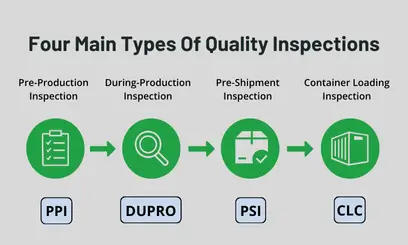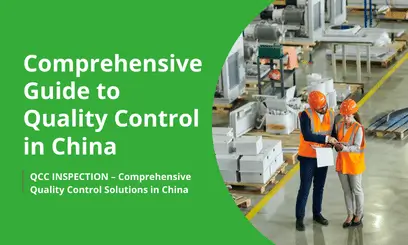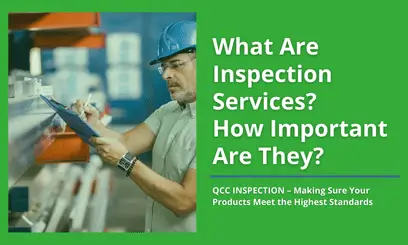What is an inspection company?
An inspection company is an independent third-party organization providing quality control and compliance verification through product inspections, factory audits, and laboratory testing.
Supporting businesses from supplier evaluation to final shipment, they ensure raw materials, production processes, and finished goods meet client specifications and international standards.
By mitigating risks and safeguarding investments, they help retailers, traders, and importers maintain product quality and comply with regulations. Enhancing supply chain transparency ensures greater confidence in global trade.
Why do You Need a Product Quality Inspection Company?
In international trade, ensuring product quality, regulatory compliance, and supplier reliability is fundamental to long-term success.
For importers, retailers, and brand owners, partnering with a professional inspection company provides an essential safeguard against financial losses, reputational damage, and legal risks.
Reduce Financial Risks
In international trade, poor product quality can lead to returns, rejections, recalls, and strained customer relationships.
Third-party inspections before shipment help identify defects early, allowing businesses to take corrective action and prevent substandard products from reaching the market. This approach reduces financial losses and supports product consistency.
Discrepancies between initial samples and mass production can create challenges, as some suppliers may cut corners during large-scale manufacturing.
Independent inspections confirm that finished products match agreed specifications and comply with customer and regulatory standards. Container Loading Supervision (CLS) further strengthens oversight by verifying that goods are packed as contracted.
Protect Brand Reputation
Product quality must align with market positioning to maintain customer satisfaction and loyalty. Well-made products enhance consumer trust, while defects and inconsistencies can lead to negative reviews and weaken brand credibility.
Recalls due to quality defects or safety issues can damage a brand’s reputation and lead to financial losses. Inspection companies conduct laboratory testing, such as chemical analysis and mechanical performance assessments, to verify compliance with industry standards.
Identifying issues before products reach the market helps businesses prevent recalls, meet regulations, and maintain brand reliability.
Protect Legal Interests
Adhering to import regulations helps businesses prevent fines, product seizures, and legal action. Third-party inspections verify that products meet market-specific standards, such as CE and RoHS in Europe, FCC and FDA in the U.S., and CSA in Canada, reducing the risk of shipment detentions and sales bans.
Disputes may arise if suppliers fail to meet agreed quality standards. Inspection reports provide clear evidence, helping businesses address trade conflicts and legal claims. These reports can also serve as payment conditions, ensuring that importers release funds only after confirming product compliance.
Common Types of Product Inspections in China
Initial Production Check (IPC)
Also known as Pre-Production Inspection (PPI), IPC is conducted before mass production starts to verify that raw materials and components meet quality standards. This inspection helps detect potential issues early, reducing waste and production delays. It focuses on product specifications, material quality, and factory conditions to ensure stable manufacturing.
Read More >>
During Production Inspection (DPI)
DPI, or In-Process Inspection, takes place at different production stages to check compliance with approved samples and specifications. Inspectors examine raw material processing, assembly, and packaging to identify and address quality issues before they affect the entire batch. DPI helps maintain consistent quality, reduce rework, and keep production on schedule.
Read More >>
Pre-Shipment Inspection (PSI)
Also known as Final Random Inspection (FRI), PSI is carried out when at least 80% of the order is completed and packaged. Inspectors randomly select samples using the Acceptable Quality Limit (AQL) standard to check appearance, function, size, packaging, labeling, and compliance. This final review helps prevent defective shipments and reduces risks of returns and disputes.
Read More >>
Defect Sorting Inspection (DSI)
DSI, or 100% Inspection, involves checking each product individually to eliminate defects before shipment. Products are categorized based on minor, major, or critical defects, ensuring only acceptable units are shipped. This thorough screening reduces complaints, returns, and brand reputation damage.
Read More >>
Container Loading Supervision (CLS)
CLS, or Container Loading Inspection, ensures that products are packed and loaded correctly. Inspectors monitor handling, verify quantities, and check that goods are secured properly. This prevents shortages, mislabeling, and damage during transport, ensuring shipments arrive as expected.
Read More >>
Production Monitoring (PM)
PM provides real-time tracking of production progress and quality control. It helps detect delays, equipment malfunctions, or material shortages before they impact deadlines. Continuous oversight allows factories to make timely adjustments, ensuring smooth operations and consistent quality.
Read More >>
Sample Testing
Conducted in a laboratory, Sample Testing assesses product compliance with market regulations and certification requirements. Tests evaluate safety, durability, material composition, and environmental compliance for certifications such as CE, FCC, FDA, and RoHS. This ensures products meet legal and quality standards before mass production and market entry.
Read More >>
How to Choose a Reliable Inspection Company in China
With numerous inspection companies in the market, finding a professional and transparent service provider requires a thorough assessment. Careful evaluation ensures reliability, accuracy, and consistency in quality control.
Conduct an On-Site Visit to Avoid Fraudulent Companies
In China, some small inspection firms operate as temporary teams, lacking stability and potentially closing down overnight. To ensure you are selecting a legitimate and reliable inspection company, consider the following:
- Visit the inspection company’s office: Verify whether they have a formal office space rather than operating from a residential area, apartment, or virtual address.
- Check the business license: Ensure it matches the information on their website and explicitly states “third-party inspection” in the business scope.
- Understand their staffing situation: Do they have full-time inspectors, or do they rely solely on temporary freelance inspectors?
If an on-site visit is not possible, request office photos, team pictures, or company registration documents to confirm their legitimacy.
Verify Certifications and Industry Accreditation
Ensuring that an inspection company has proper certifications and industry accreditations is key to evaluating its professionalism and compliance.
The following are some essential industry certifications:
ISO 9001 Certification (Quality Management System):
Ensures that the inspection company has a standardized quality management system and maintains stable service quality.
ISO 17020 Certification (CNAS Accreditation):
Applicable to third-party inspection bodies, ensuring that the company’s technical capabilities comply with industry standards.
CMA Certification (China Metrology Accreditation):
Required for laboratory testing institutions to guarantee the legal validity of test data.
AQSIQ Registration (General Administration of Quality Supervision, Inspection, and Quarantine of China):
Confirms the legal qualification of an inspection company operating in China.
Although certification alone does not guarantee service quality, having the necessary accreditations indicates that the company’s management system and inspection capabilities meet industry standards.
Choose an Inspection Company with Extensive Industry Experience
Inspection requirements vary by industry, so selecting a company familiar with your product category is beneficial.
Consider:
Industry Specialization: Inspection requirements vary across electronics, textiles, machinery, food packaging, and other industries. The inspection company should have the necessary expertise and experience.
Client Case Studies: Check whether they have prior experience inspecting similar products and if they have worked with international clients.
Standardized Reports: Request sample inspection reports for similar products to ensure their process aligns with your quality control requirements.
Inspection Checklist (CheckList): A professional inspection company should have a detailed checklist for your specific product type,
covering:
• Key dimensions and functional tests
• Packaging and labeling compliance checks
• Major safety and performance tests
• Inspection methods for critical components
Technical Knowledge Assessment: Ask the inspection company product-related technical questions, such as industry standards, common defects, and testing methods. This helps evaluate their expertise and whether their inspectors have received professional training.
If the inspection company is unfamiliar with your product’s quality standards, they may overlook key defects, which could disrupt your supply chain.
Assess Service Coverage and Inspection Capabilities
A well-equipped inspection company should operate in major manufacturing regions such as Guangdong, Zhejiang, Jiangsu, and Fujian.
It should also provide inspection services in Southeast Asia, including Vietnam, India, and Bangladesh, to support global supply chains.
Comprehensive services should include laboratory testing for regulatory compliance, such as CE, FCC, FDA, and RoHS, along with factory audits for supplier evaluations and social responsibility assessments. Limited service coverage may lead to delays, disrupting supply chain efficiency.
Verify Transparency and Independence
An inspection company should function as an independent third party, free from supplier influence, to ensure unbiased results.
Transparency can be demonstrated through remote video inspections, real-time updates, and detailed reports with photos, test data, defect classifications, and sampling standards.
Strict anti-corruption policies should be in place to prevent conflicts of interest and maintain inspection integrity. A transparent and independent process helps businesses detect quality issues early and meet product standards.
Evaluate Pricing for Value and Reliability
Inspection costs should be clear and inclusive, avoiding hidden charges for travel, expedited services, or reports. Companies offering unreasonably low prices may lack qualified inspectors, leading to inconsistent standards and poor quality control.
Reputable providers offer detailed reports with comprehensive test data, defect classifications, and corrective action recommendations. Prioritizing service quality over cost savings ensures better long-term reliability in product inspections.
Review Customer Support and Response Efficiency
A reliable inspection company should schedule inspections within 48 hours to prevent shipment delays. Dedicated account managers streamline communication, reducing misinterpretations and errors.
Multilingual support, including English, Spanish, and German, ensures smooth collaboration with global suppliers.
Companies that provide real-time updates through remote monitoring, live inspection feedback, and regular reports enhance transparency and efficiency in quality management. Responsive and well-structured support helps businesses minimize risks and maintain supply chain stability.
Check Customer Reviews and Industry Reputation
The reputation of an inspection company reflects its long-term service quality, customer satisfaction, and industry standing. To evaluate market credibility:
Customer Feedback:
Check the inspection company’s website, Google reviews, industry forums, or supply chain platforms (such as Alibaba ratings) for customer feedback, especially from international buyers. If there are few reviews, consider customer recommendations or past cooperation cases. Pay attention to negative feedback, particularly regarding service quality, report accuracy, and inspector professionalism.
Industry Experience & Case Studies:
Has the inspection company worked with global brands or well-known trading companies? Can they provide case studies showing how they helped clients identify and solve quality issues?
Industry Recognition:
Do they have a positive industry standing? Have they received recommendations from trade associations, sourcing fairs, or international buyers?
A trustworthy inspection company typically has a long-term, stable customer base and positive industry recognition. If there are few or mostly negative reviews, proceed with caution!
Conclusion
Choosing a trustworthy inspection company involves more than reviewing certifications and service capabilities. Impartiality, service coverage, industry reputation, and response efficiency all play a significant role in ensuring consistent quality control.
A thorough evaluation of these factors helps businesses secure a reliable third-party inspection partner, reducing risks and maintaining supply chain stability.
QCC Inspection offers professional, transparent, and efficient inspection services to help businesses maintain high product standards.
With extensive industry experience and a commitment to accuracy, QCC ensures that products meet regulatory and customer requirements. Contact us now to explore tailored inspection solutions for your business needs.


 April 05,2025
April 05,2025
